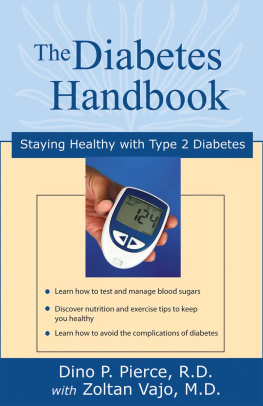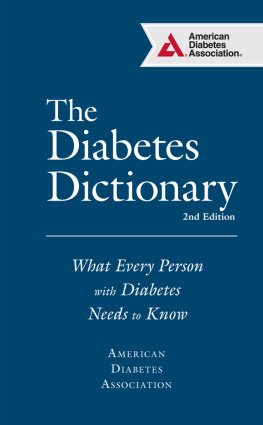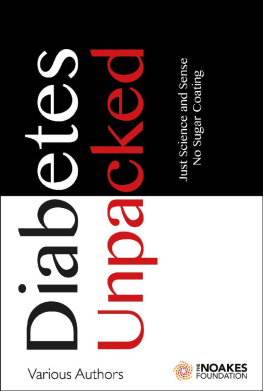Making the Mexican Diabetic
Making the Mexican Diabetic
Race, Science, and the Genetics of Inequality
Michael J. Montoya

University of California Press, one of the most distinguished university presses in the United States, enriches lives around the world by advancing scholarship in the humanities, social sciences, and natural sciences. Its activities are supported by the UC Press Foundation and by philanthropic contributions from individuals and institutions. For more information, visit www.ucpress.edu .
University of California Press
Berkeley and Los Angeles, California
University of California Press, Ltd.
London, England
2011 by The Regents of the University of California
Library of Congress Cataloging-in-Publication Data
Montoya, Michael J. 1965
Making the Mexican diabetic : race, science, and the genetics of inequality / Michael Montoya.
p. cm.
Includes bibliographical references and index.
ISBN 978-0-520-26730-5 (hardcover : alk. paper)
ISBN 978-0-520-26731-2 (pbk. : alk. paper)
1. Non-insulin-dependent diabetesMexicoGenetic aspects. 2. Mexican AmericansHealth and hygiene. I. Title.
[DNLM: 1. Diabetes MellitusethnologyMexico. 2. Diabetes MellitusethnologyUnited States. 3. Genetic ResearchMexico. 4. Genetic ResearchUnited States. 5. Indians, North AmericanethnologyMexico. 6. Indians, North AmericanethnologyUnited States. 7. Mexican AmericansethnologyMexico. 8. Mexican AmericansethnologyUnited States. 9. Risk FactorsMexico. 10. Risk FactorsUnited States. 11. Socioeconomic FactorsMexico. 12. Socioeconomic FactorsUnited States. WK 810]
RA645.D5M66 2011
362.196'462008968 72073dc22
2010038017
Manufactured in the United States of America
19 18 17 16 15 14 13 12 11 10
10 9 8 7 6 5 4 3 2 1
This book is printed on Cascades Enviro 100, a 100% post consumer waste, recycled, de-inked fiber. FSC recycled certified and processed chlorine free. It is acid free, Ecologo certified, and manufactured by BioGas energy.
For Johanna, Zoe, Eliah, and Sidra for accompanying me on this journey. I delight in the prospects of accompanying you on yours.
Contents
Introduction
Situating Problems of Knowledge |
Conclusion
Beyond Reductionism: Bioethnicity and the Genetics of Inequality |
Acknowledgments
Research for this book would not have been possible without the financial support of the Ford Foundation, the Wenner-Gren Foundation, the National Science Foundation, and the Department of Anthropology at Stanford University. The School of Social Sciences and The Center for the Study of Latinos in a Global Society, both at the University of CaliforniaIrvine also supported this project financially. Additionally, there are a great many people who have assisted me with this project. I wish to thank the mutual support of colleagues at Stanford including Carole Blackburn, Rozita Dimova, Martha Gonzales-Cortes, Hideko Mitsui, Doug Smith and Miriam Ticktin for their feedback, encouragement, and solidarity through institutional and research challenges of one sort or another. To Nicolas De Genova, I am indebted to the unfettered use of his apartment on my frequent visits to Chicago, for challenging and provocative conversations during the data collection phase of this research, and for productive conversations during the revision phase of this book.
For their wisdom, solidarity and constructive feedback on many facets of this project, words of thanks are due to Deborah Heath, Linda Hogle, Chris Schofield, Joyce Kirk, Erin Koch, Barbara Ley, Paul Rabinow, Rayna Rapp, Alan Goodman, Karen-Sue Taussig, Jay Kaufman, Tom Lauderbach and to Vydunas and Jenny Morgan-Tumas. For reviews of all or portions of this manuscript, I am indebted to two anonymous reviewers, Stefan Helmreich and colleagues in the Departments of Anthropology and Chicano/Latino Studies at UC-Irvine, especially Mei Zhan, Angela Garcia, Kris Peterson, Victoria Bernal, Susan Greenhalgh, Kaushik Sunder Rajan, Bill Maurer, and Leo Chavez. This project has also benefited from the conversations, formal and informal, with Sheena Nahm, Cristina Bejarano, Erin Kent, Connie McGuire and the students in Borders and Bodies and Proseminar courses in the department of anthropology as well as my medical students in the Program in Medical Education for the Latino Community (PRIME-LC) in the UCI School of Medicine. Jose Rea and Victor Becerra can never be repaid for their continued support and inspiration.
Portions of this book were presented at numerous venues and I am indebted to the questions and comments I received at each. Early drafts of were presented at the American Anthropological Association, at the Stanford Center for Biomedical Ethics Works in Progress Series, and at the University of Wisconsin, Madison, Science and Technology Studies Program. Sections of this book were also presented at Portland State University School of Community Health (Portland, OR) the Five Colleges Faculty Seminar in Culture, Health and Science (Amherst, MA) the New England Regional Conference on Medical Anthropology (1995), and the Culture, Medicine and Power conference at the University of Minnesota. I have benefited also from the many thoughtful comments from colleagues at the University of Kentucky, University of Chicago, University of California-Los Angeles, University of California-Riverside, and University of California-Davis. I found the discussions held at the Genetics, Admixture and Identity workshop at the University College London organized by Sarha Gibbon, Monica Sans, and Carlos Ventura Santos especially useful in furthering my understanding of population genetics. I am also indebted to Yin Paradies and Malia Fullerton for their thoughtful criticisms and technical advice while I worked through sections of this manuscript.
Additionally, I thank Sylvia Yanagisako, Joan Fujimura, Nancy Chen, and Sarah Jain, for their insightful, challenging and always-helpful feedback and encouragement. I would also like to thank Renato Rosaldo, Jane Collier, Paulla Ebron, Akhil Gupta, Miyako Inoue, and Purnima Mankekar. Their influence is clearly evident throughout. Additionally, Troy Duster, Duana Fullwiley, Melbourne Tapper, Jonathan Kahn, the late Helen Montoya-Cox, Judy Treskow, Joyce F. Kirk, Carla Rodriguez Gonzalez, Cristina Bejarano, and Rachael Stryker have all influenced this project in ways great and small. I am also indebted to the careful guidance of Naomi Schneider, Kalicia Pivirotto, Kate Warne, and Mari Coates at University of California Press. The copy editor Norma McLemore and the production editor Christine Dahlin prevented a raft of grammatical and typographical embarrassments. I and my readers can thank J. Naomi Linzer, the indexer, for her skillful guide to key terms. All remaining errors and omissions, technical or conceptual, are mine alone.
Of course, this project would not have been possible without the countless scientists and research staff who agreed to be interviewed, observed and accompanied from Mexico, the United States, and the United Kingdom, but especially Nora, Gary, Carl and Judi (because of human subject requirements, pseudonyms have been used throughout this book). This book is surely better as a result of their insight. A special thanks go to Jim and Jean Morgan for their ever ready support and wise counsel. Finally, I want to thank Janet Walker and Ernest and Gayla Walker whose enduring support fueled more hours of work when sheer force of will did not.
Preface
My thinking for this project began with my encounter with the technosciences as a member of the research team for Mapping Genetic Knowledge, funded by the National Institutes of Health through its Ethical, Legal and Social Implications Research Program. Led by Deborah Heath, Rayna Rapp and Karen-Sue Taussig, the project was an anthropological venture into the basic scientific, clinical, and lay understandings of three heritable connective tissue disorders. Along with two other research assistants, Barbara Ley and Erin Koch, I spent three years (full time during the summers) conducting ethnography in labs, online, and at conferences, learning from and with scientists, clinicians, and lay communities of affected persons. The world of science studies and of the anthropology of medicine had become flesh in my interviews, bench-side conversations and experiences, and interactions with three practicing anthropologists. I learned the look and feel of scientific collaboration, interdisciplinarity, stratified knowledge products and networks, and arcane scientific debates of tremendous consequence. I explored the conundrum of multiple accountabilities in contexts in which the stakes for ethnographic knowledge were seemingly dwarfed in comparison to the discovery of the gene for a condition suffered by thousands, which was now rendered preventable. Additionally, I was humbled by the suffering, stamina, and vigor of those persons and families who dealt with the life-and-death uncertainties of these conditions. It is from here that I crafted my interests in the sciences of diabetes.
Next page










